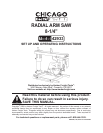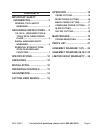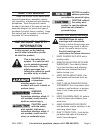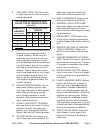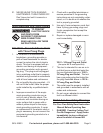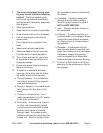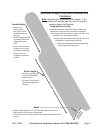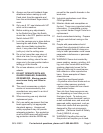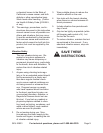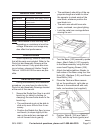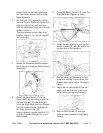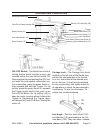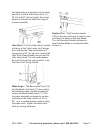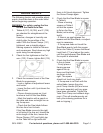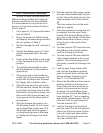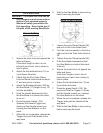SKU 42933 For technical questions, please call 1-800-444-3353. Page 6
The torque developed during brak-2.
ing may loosen the blade-retaining
nut/bolt. The blade retaining nut/
bolt should be checked periodically
and tightened if necessary, especially
after braking.
Wear eye protection.3.
Keep hands out of path of saw blade.4.
Know how to reduce risk of kickback.5.
Use an appropriate push-stick for 6.
narrow work.
Do not perform any operation free-7.
hand.
Never reach around saw blade.8.
Return carriage to the full rear posi-9.
tion after each crosscut operation.
Turn off tool and wait for saw blade 10.
to stop before moving workpiece or
changing settings.
Disconnect power before changing 11.
blade or servicing.
To properly understand all safety 12.
warnings, be familiar with the follow-
ing safety terms and equipment:
Through-sawing – A cut made from a.
one side of a board to the opposite
side, without stopping.
Ripcut or Ripping - A cut made paral-b.
lel to (along with) the grain of the
wood.
Crosscut or Crosscutting - A cut c.
made perpendicular (at a 90° angle)
to the grain of the wood.
Push-stick – A narrow strip of wood d.
or other soft material with a notch
cut into one end and which is used
to push short pieces of material
through saws. It provides a safe
distance between the hands and the
cutting tool. Must be narrower than
the cut width to prevent contact with
the blade.
Freehand – Feeding a workpiece e.
through the saw without using a
fence or guided support to guide it.
NOT A SAFE METHOD.
Kerf – The gap made by the saw in f.
the workpiece.
Kickback – A sudden reaction to a g.
pinched, bound, or misaligned blade,
causing an uncontrolled workpiece
to lift up and out of the saw toward
the operator.
Spreader – A metal plate that fol-h.
lows the saw blade to keep the kerf
(gap) from closing on the saw blade.
Spreaders, except riving knives,
must be aligned to the blade after
blade adjustment to prevent binding.
Construct a Push Stick out of Wood 13.
according to the guidelines on the fol-
lowing page.



